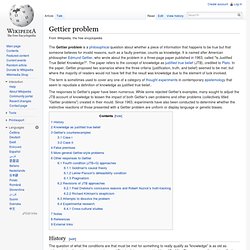

Gettier problem. The Gettier problem is a philosophical question about whether a piece of information that happens to be true but that someone believes for invalid reasons, such as a faulty premise, counts as knowledge.

It is named after American philosopher Edmund Gettier, who wrote about the problem in a three-page paper published in 1963, called "Is Justified True Belief Knowledge? ". The paper refers to the concept of knowledge as justified true belief (JTB), credited to Plato. In the paper, Gettier proposed two scenarios where the three criteria (justification, truth, and belief) seemed to be met, but where the majority of readers would not have felt that the result was knowledge due to the element of luck involved. The term is sometimes used to cover any one of a category of thought experiments in contemporary epistemology that seem to repudiate a definition of knowledge as justified true belief.. The responses to Gettier's paper have been numerous. History. Knowledge as justified true belief.
Gettier's counterexamples. False premises. More general Gettier-style problems.